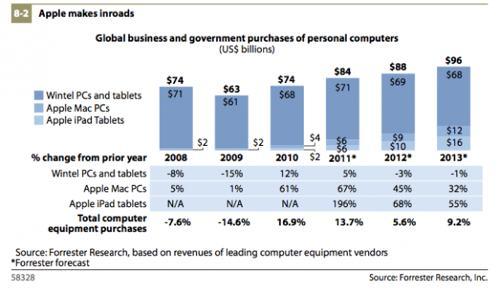Survey suggests 50% growth in enterprise spending on Apple products in 2012
Forrester Research issued its Global Tech Market Outlook for 2012 and 2013 on Friday, as noted by MacNN.
The firm said "Bring Your Own Device" policies have helped to open up IT departments to Macs, iPhones and iPads. Other factors cited as reasons for the growth include small businesses buying Macs and iPads for employees to use at home and work and IT departments' shifts toward mobile with the iPhone and iPad.
According to the survey, the business sector will buy $10 billion worth of iPads this year, up from $6 billion in 2011. IT departments are also projected to spend $9 billion on Macs in 2012, up from $6 billion in 2011. Mac and iPad spending will rise to $12 billion and $16 billion, respectively in 2013, according to the survey.
Apple revealed last October that 93 percent of the Fortune 500 were deploying or testing the iPhone during the September quarter, up from 91 percent in the second quarter of calendar 2011. As for iPads, 90 percent of the Fortune 500 are deploying or testing Apple's touchscreen tablet as of the September quarter.
The rise in corporate spending on Apple comes as Windows-based computer purchases are expected to decline slightly over the next two years. Forrester sees business and government sales of Windows PCs and tablets falling three percent in 2012 and another one percent in 2013.
To conduct the survey, Forrester interviewed 46 IT vendors, and studied large corporate or institutional purchasers, including U.S. and international government agencies.
For years, Forrester was critical of Macs in the business sector, but it began encouraging companies to "repeal prohibition" on Macs in the enterprise last October. The research firm found that 41 percent of enterprises had blocked Macs from access to any company resources.
In November, The New York Times claimed that Apple's new CEO Tim Cook has made enterprise customers "more at ease" with the company than late co-founder Steve Jobs.
"(Cook) met more frequently with corporate customers and seemed to appreciate their needs, even if he did not deviate from Mr. Jobs's views about making consumers the priority when making Apple products," the report said.
 Josh Ong
Josh Ong











 Andrew Orr
Andrew Orr
 William Gallagher
William Gallagher

 Mike Wuerthele
Mike Wuerthele
 Christine McKee
Christine McKee

 Malcolm Owen
Malcolm Owen
 Amber Neely
Amber Neely







